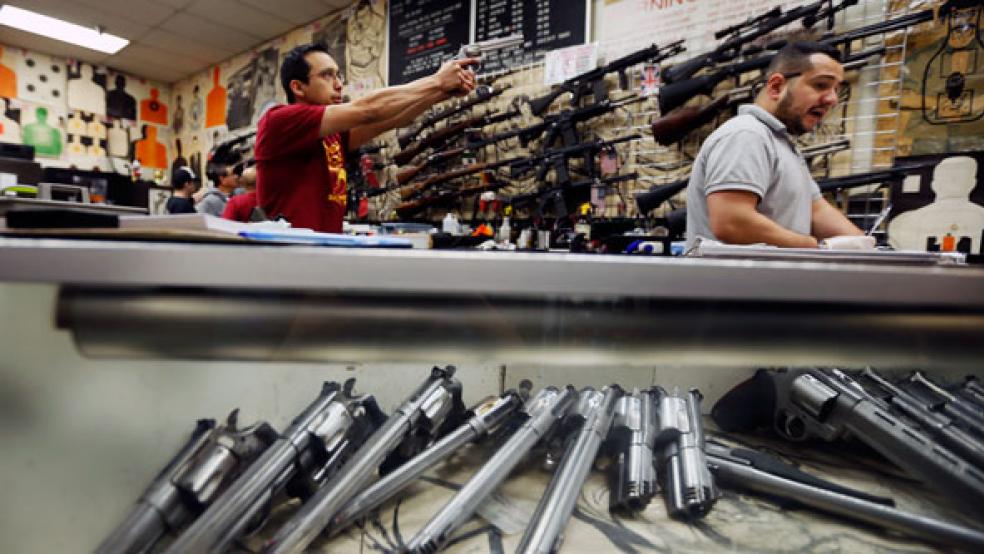When having people over to dinner, it’s best not to discuss politics, religion – or guns. That’s something the actor Charlton Heston and Laurence Tribe, the Harvard constitutional scholar, figured out – sort of.
But first, a little background.
Tribe, the liberal legal expert who spoke with editors of The Fiscal Times this week about his new book, Uncertain Justice: The Roberts Court and the Constitution, includes a chapter about gun rights.
Related: Gun Control – A New Look at the Second Amendment
In the 2008 landmark 5-4 Supreme Court decision, District of Columbia v. Heller, the court held that the Second Amendment protects an individual’s right to possess a firearm unconnected with service in a militia, and to use that arm for traditionally lawful purposes (such as self-defense within the home) against federal regulation – something not clearly articulated before.
Two years after that ruling, SCOTUS “extended that newly recognized right to armed self-defense,” says Tribe in his book, “into a shield against state and local gun laws,” in its ruling in McDonald v. Chicago.
Back in 2000, however, Tribe received a phone call from the Oscar-winning actor, then president of the National Rifle Association.
Tribe had just released a startling statement in the third edition of his treatise on constitutional law, surprising his liberal friends on this issue, he told The Fiscal Times. “I included a very, very, very long footnote about why I thought the Second Amendment was not limited to state militias, even though there’s that preamble [in the amendment], but that it does to some extent protect personal rights.”
Related: Gun Culture Puts Target and Other Chains in the Line of Fire
Tribe described the reaction that followed: “There was a front page story in The New York Times saying that a leading liberal scholar said the Second Amendment protects gun owners.”
Enter Heston.
“I got a call immediately from Charlton Heston,” said Tribe. “He called me up and said, ‘Professor Tribe, I think we have a lot in common here’ – he was then the president of the NRA – ‘and I have a private plane waiting at Logan and an island that I would like to take you to. And we can discuss all of these things over some margaritas or whatever.”
Dramatic pause on Tribe’s part – but the private plane (or the booze) had nothing to do with it. “I said right away, ‘Whoa, Mr. Heston. I’m a great admirer of yours and I loved Planet of the Apes,’” he recounted on Tuesday. “‘But I don’t think we’re on the same page here. I’m in favor of strong gun safety regulations and rules that I think are consistent with the Second Amendment.’”
At that, Heston abruptly hung up. “And I never heard from him again,” said Tribe.
Related: Bloomberg Tries to Beat the Powerful NRA at Its Own Game
So no margaritas? “No margaritas,” said Tribe.
No island? “No island, no private plane,” said Tribe. (And no more Heston, alas – he passed away in 2005.)
Is the squabble between these two men really surprising? “Guns divide the American people,” Tribe writes in his book. “For decades, we have struggled to fashion laws that balance safety against a rich tradition of gun ownership… The mere mention of guns often incites hot-tempered debate and more talking than listening among otherwise reasonable people.”
The Second Amendment isn’t really the culprit, maintains Tribe. “The First Amendment is much more responsible in a way for the problems of gun violence in America than the Second Amendment. Not that I would get rid of either – but I certainly wouldn’t get rid of the First Amendment. ” he said on Tuesday.
“The ability of groups like the National Rifle Association, for example, to persuade people to make it a voting issue – that accounts for the difficulty that Congress has had in passing even the most minimal kinds of gun regulations that would clearly pass muster under the Second Amendment, as interpreted by the Supreme Court.”
Top Reads from The Fiscal Times:





